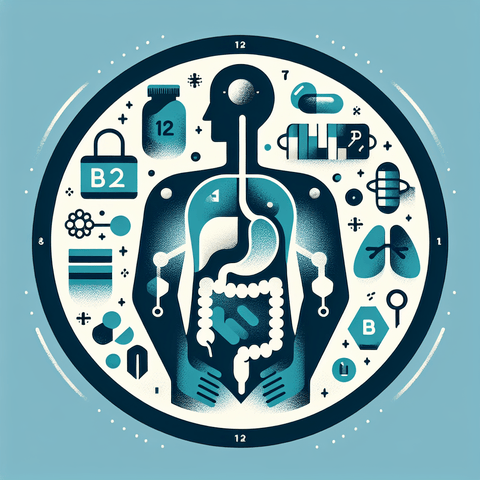Introduction
Vitamin B12, also known as cobalamin, is an essential water-soluble vitamin pivotal to numerous physiological processes that underpin overall health and well-being. Its significance pervades from energy metabolism and neurological function to the formation of blood cells and DNA synthesis. Despite its vital roles, many individuals—including those on specialized diets or facing specific health challenges—may struggle to maintain adequate B12 levels. Understanding how Vitamin B12 is absorbed by the body, the factors that influence this process, and strategies to optimize absorption is crucial for anyone aiming to support their health through nutritional supplementation. This comprehensive guide aims to unlock the secrets of Vitamin B12 absorption, offering insights into its mechanisms, sources, and effective supplementation methods to help you achieve optimal wellness.
Understanding Vitamin B12 and Its Role in Nutritional Supplements
Vitamin B12 is a complex corrinoid compound characterized by its unique cobalt atom nestled within a corrin ring. It plays an indispensable role in numerous biological functions, particularly in the synthesis of red blood cells, neurological health, and DNA production. Due to its involvement in critical metabolic pathways, B12 is a fundamental component of many nutritional supplement formulations aimed at preventing or addressing deficiencies. Its importance is especially pronounced in populations where dietary intake may be limited or absorption compromised.
From a biological standpoint, B12 acts as a cofactor for important enzymes such as methionine synthase and methylmalonyl-CoA mutase. These enzymes facilitate methylation processes necessary for DNA synthesis and fatty acid metabolism, respectively. Health benefits associated with adequate B12 levels include improved energy production, cognitive function, and cardiovascular health.
Ensuring sufficient B12 intake can be challenging. Traditionally, B12 is predominantly found in animal-derived foods such as meat, eggs, dairy products, and shellfish. However, certain populations—like vegans, vegetarians, older adults, and individuals with specific medical conditions—are at increased risk of deficiency due to limited dietary sources or impaired absorption capabilities. For these individuals, supplementation becomes a vital strategy. B12 supplements come in various forms—including oral tablets, sublingual preparations, injections, and others—to address different needs and absorption efficiencies.
Addressing B12 deficiency is critical because prolonged deficiency can lead to serious health issues such as megaloblastic anemia and neurological impairments. Supplementation, when properly managed, can support healthy B12 levels and promote overall wellness. Understanding the underlying factors influencing absorption is key to maximizing the benefits of B12 supplements and maintaining optimal health.
Factors Affecting B12 Absorption in Nutritional Supplements
The journey of Vitamin B12 from ingestion to cellular utilization is complex and involves multiple physiological steps. Most importantly, various factors can influence how well B12 is absorbed when taken through supplements. Recognizing these factors enables individuals to optimize their supplementation regimen for maximum benefit.
The initial step in B12 absorption occurs within the gastrointestinal tract. When B12-containing food or supplements enter the stomach, stomach acid and intrinsic factor (a glycoprotein secreted by the parietal cells of the stomach lining) facilitate the release of B12 from proteins. The free B12 then binds to intrinsic factor, forming a complex that is recognized by receptors in the ileum, the last section of the small intestine, for absorption.
Several factors can impact this process. First, **gastrointestinal tract health** plays a significant role. Conditions such as atrophic gastritis, achlorhydria (low stomach acid), celiac disease, Crohn’s disease, and surgical removal of parts of the stomach or ileum can impair intrinsic factor production or gut integrity, thus reducing B12 absorption. For example, aging often involves a decline in stomach acid production, necessitating alternative supplementation methods.
Second, the **dose and form of B12 in supplements** determine how effectively the nutrient is absorbed. High doses of oral B12, particularly those exceeding 1,000 micrograms, can sometimes be absorbed passively without intrinsic factor via diffusion, making high-dose oral supplements a viable option for many people. Sublingual forms—such as sprays or tablets placed under the tongue—bypass some aspects of gastrointestinal absorption, though scientific evidence about their superior efficacy remains mixed.
Third, **age-related changes** become critical, as elderly individuals often experience reduced stomach acid and intrinsic factor secretion. This decline can be mitigated through alternative delivery methods, such as injections or high-dose oral supplements.
Fourth, **interactions with other nutrients and medications** can hinder B12 absorption. For example, the use of antacids, proton pump inhibitors, and histamine H2 receptor blockers—common drugs for acid reflux—can reduce stomach acid levels, impairing B12 release. Similarly, antibiotics might affect gut flora involved in B12 absorption. Excessive alcohol consumption may also damage the gastric mucosa, further impairing digestion and absorption.
To maximize B12 absorption from supplements, individuals should consider taking them with meals to promote gastric activity, opt for appropriate forms based on their physiology, and avoid medications that may interfere unless directed by a healthcare provider. Regular monitoring of B12 status can help identify issues early and adjust supplementation strategies accordingly.
The Importance of Intrinsic Factor for B12 Absorption
Intrinsic factor (IF) is a glycoprotein secreted by parietal cells in the stomach lining. Its critical role involves binding to dietary B12 to form a complex that is recognized by specific receptors in the ileum, facilitating the vitamin’s absorption into the bloodstream. Without intrinsic factor, the body cannot efficiently absorb B12 through the normal physiological pathway, leading to deficiency regardless of intake levels.
Intrinsic factor deficiency is the hallmark of pernicious anemia, an autoimmune disorder where the immune system attacks the stomach lining, impairing IF production. This condition results in impaired B12 absorption and subsequent anemia, often accompanied by neurological symptoms such as numbness, tingling, and cognitive disturbances if left untreated. Other factors affecting intrinsic factor include surgical removal of gastric tissue, certain gastrointestinal diseases, and age-related decline.
When intrinsic factor production is compromised, healthcare providers often recommend B12 injections of cyanocobalamin or hydroxocobalamin. These injectable forms bypass the need for IF entirely, delivering B12 directly into the bloodstream for cellular uptake. In recent years, high-dose oral B12 supplements have also demonstrated efficacy in some cases, utilizing passive diffusion mechanisms that do not require intrinsic factor.
Strategies to overcome intrinsic factor-related absorption challenges involve medical interventions such as B12 injections or high-dose oral therapy. Regular monitoring of serum B12 levels, along with clinical assessments, guides the appropriate approach for individuals with intrinsic factor deficiency. Emerging research continues to explore alternative delivery systems, including nasal sprays and transdermal patches, to enhance absorption in affected populations.
Vegan B12 Sources and Their Role in Nutritional Supplementation
Obtaining sufficient B12 from a purely plant-based diet presents a unique challenge given that natural dietary sources are predominantly animal-derived. Plant foods naturally containing vitamin B12 are scarce, and many so-called "plant-based" foods contain B12 only as a result of contamination or fortification.
Natural B12 sources suitable for vegans include fortified foods such as plant milks, cereals, and nutritional yeasts. Certain types of algae, like *Nori* or *Chlorella*, are sometimes claimed to contain B12; however, the bioavailability and reliability of these sources are contentious, and they are not universally sufficient to meet daily requirements.
Because natural, unfortified plant foods often fall short, fortified products and dietary supplements are critical for vegans. Fortification with methylcobalamin or cyanocobalamin provides a stable and bioavailable form of B12. Regular intake of fortified foods or B12 supplements ensures that vegans maintain adequate levels without risking deficiencies.
The recommended supplemental doses for vegans generally range from 25 to 100 micrograms per day, depending on individual absorption capacity and serum B12 levels. Because the body only absorbs a small fraction of high-dose B12 through passive diffusion—typically about 1% of the dose—higher doses may be necessary to ensure sufficient absorption. Incorporating fortified foods and supplements into daily routines offers a practical, reliable strategy for maintaining B12 adequacy in plant-based diets.
For vegan consumers interested in high-quality supplements, [Topvitamine](https://www.topvitamine.com/collections/vitamin-b12-benefits-sources-safety) offers a variety of B12 supplementation options formulated specifically for plant-based lifestyles, supporting safe and effective nutrient intake.
Recognizing B12 Deficiency Symptoms in the Context of Nutritional Supplements
Vitamin B12 deficiency can manifest through a spectrum of symptoms, often developing gradually and sometimes being mistaken for other health issues. Recognizing these signs early allows for prompt intervention and effective management through supplementation or medical treatment.
Common symptoms include persistent fatigue, weakness, and pale or jaundiced skin resulting from anemia. Neurological symptoms may involve numbness or tingling in the extremities, balance problems, memory impairment, and mood disturbances. In severe cases, deficiency can lead to irreversible neurological damage if untreated over extended periods.
B12 deficiency may be masked by other conditions or misdiagnosed, especially because initial symptoms are often nonspecific. Blood tests assessing serum B12 levels, methylmalonic acid (MMA), and homocysteine concentrations provide more accurate assessments of B12 status. Individuals with risk factors, such as vegans, older adults, and those with gastrointestinal disorders, should seek regular monitoring to prevent deficiency symptoms from progressing.
Supplementation often results in rapid symptom improvement, but the effectiveness depends on timely intervention and appropriate dosing. Personalized healthcare plans that consider individual absorption capacity and health status are crucial. It is essential to consult healthcare professionals who can tailor supplementation strategies, monitor progress, and adjust doses as necessary to achieve optimal B12 status.
Effective B12 Supplementation Methods for Optimal Absorption
Choosing the most effective B12 supplementation method depends on individual health status, absorption capacity, and preferences. Multiple delivery systems exist, each with advantages and disadvantages.
Oral Supplements: Tablets, capsules, and liquids are widely accessible, convenient, and cost-effective. For most individuals with normal gastrointestinal health, high-dose oral B12 (e.g., 1000 micrograms or more) can effectively maintain B12 status, thanks to passive diffusion mechanisms. They are suitable for daily use and generally well-tolerated. For example, [Topvitamine’s](https://www.topvitamine.com/collections/vitamin-b12-benefits-sources-safety) B12 tablets are designed for easy absorption and compliance.
Sublingual Preparations: Sprays and tablets placed under the tongue aim to bypass some gut absorption issues. The sublingual route allows direct absorption into the bloodstream through blood vessels in the mouth. Although some studies suggest comparable efficacy to oral intake, more research is needed. Nonetheless, they are a popular choice for those with mild absorption issues.
Injections: B12 injections, typically of cyanocobalamin or hydroxocobalamin, are reserved for cases with significant absorption impairment, such as intrinsic factor deficiency or severe gastrointestinal conditions. Injections ensure serum B12 levels are quickly replenished and are especially useful in treating pernicious anemia or neurological symptoms.
Transdermal Patches or Gels: Emerging delivery systems aim to provide a non-invasive, convenient alternative. While evidence on their efficacy is still evolving, they hold promise for certain populations.
When determining the appropriate method, factors such as absorption ability, convenience, cost, and personal preference are crucial. Regular monitoring of B12 levels ensures the chosen method effectively sustains adequate serum concentrations. Safety considerations, including avoiding overdose—particularly with high-dose supplements—should be discussed with healthcare professionals.
Consultation with a healthcare provider helps tailor supplementation approaches to individual needs, ensuring optimal absorption and health outcomes.
Conclusion
Understanding the nuances of Vitamin B12 absorption is essential for maintaining optimal health, especially in populations at risk for deficiency. From the role of intrinsic factors to the impact of gastrointestinal health, diet, and supplementation methods, recognizing how B12 is absorbed empowers individuals to make informed decisions. Dietary choices, fortified foods, and appropriately selected supplement forms—be it oral, sublingual, or injectable—should be guided by individual health status and advice from healthcare professionals. Testing and monitoring B12 levels regularly ensure that supplementation strategies remain effective and safe.
Prioritizing personalized nutrition approaches, staying informed about the latest scientific insights, and proactively managing B12 intake can significantly enhance overall wellness, boost energy levels, and support neurological health. Whether you're a vegan, aging adult, or someone seeking to optimize your nutrient profile, understanding the secrets of B12 absorption will help you unlock better health.
Remember, always consult with healthcare providers before initiating any supplementation regimen, especially if you have underlying health issues or are on medications that could affect absorption or vitamin levels.
Q&A Section
Q1: Why is Vitamin B12 absorption important?
Absorption is crucial because, without it, the body cannot utilize B12 from food or supplements to support vital functions like nerve health, blood formation, and DNA synthesis. Understandings these mechanisms help optimize supplementation and prevent deficiency.
Q2: What factors can impair B12 absorption?
Factors include gastrointestinal conditions like atrophic gastritis, age-related decrease in stomach acid, use of certain medications, intrinsic factor deficiency, and gut surgeries. Ensuring proper absorption may require alternative supplementation methods such as injections or high-dose oral B12.
Q3: Are vegans at risk of B12 deficiency?
Yes, because plant-based diets lack natural B12 sources, vegans should rely on fortified foods and supplements to meet their daily needs and avoid deficiency-related health issues.
Q4: What is the best way to supplement B12 for someone with absorption problems?
For absorption impairments, B12 injections or high-dose oral supplements are recommended, as they bypass the need for intrinsic factor or normal gastrointestinal absorption.
Q5: How do I know if I need B12 supplements?
Symptoms like fatigue, neurological issues, or anemia, along with risk factors such as diet and age, suggest testing serum B12 levels. Consulting a healthcare provider is essential for personalized advice.
Important Keywords
- Vitamin B12 absorption
- B12 deficiency
- Intrinsic factor
- B12 supplements
- Vegetarian B12 sources
- Vegan B12 supplementation
- B12 deficiency symptoms
- B12 injections
- Sublingual B12
- Gastrointestinal health and B12
- Factors affecting B12 absorption
- Health benefits of B12
- B12 and neurological health
- B12 blood test
- Maintaining optimal B12 levels



